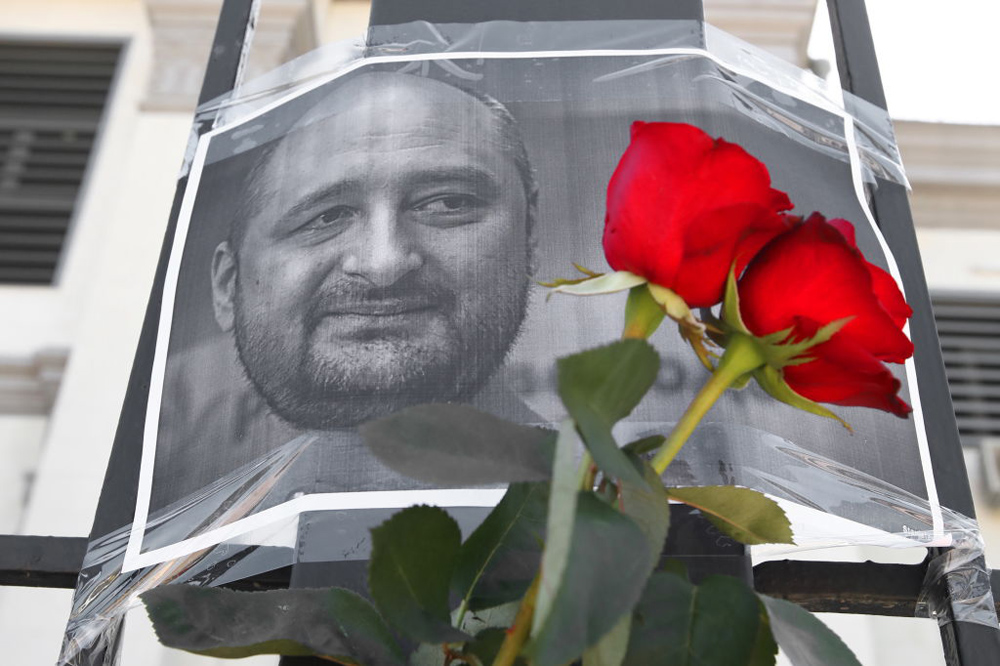At first, the incident seemed to have a tragic inevitability. Russian journalist Arkady Babchenko, a prominent critic of Russian president Vladimir Putin, had been murdered in Kiev.

Babckenko, a father of seven, had been shot in the back by a man who was waiting for him outside his apartment.
Dozens of Russian journalists have been murdered since Putin came to power, the most recent on May 24, and it seemed that Babchenko had just joined the list. Here’s what a journalists’ memorial in Moscow looked like after the reports of his killing:
GETTY IMAGES
Russia denied being behind Babchenko’s killing, a claim given unexpected credence when the murder turned out not to have happened at all.
It turned out that the murder had been staged as part of an elaborate deception which included him being smeared with pig’s blood and taken to a morgue. Ukranian authorities published a graphic photo of Babchenko, or someone said to be Babchenko, lying face-down in a pool of blood.
The hoax was a response to a genuine plot to murder him, Babchenko and Ukrainian authorities explained.
Police said that they had arrested a Ukrainian man who had been paid $40,000 to arrange Babchenko’s murder, and who had in turn hired the actual assassin.
It remains unclear why the deception was seen as necessary, if Ukrainian police were aware of the plot, or why it protects him going forward.
A backlash did not take long to form.
- “This fake may make it easier for Russians to plausibly deny being involved in other dark acts. It will give fuel to critics who doubt what they see in the news,” Poynter said.
- “The staging of his murder could undermine confidence in the work of journalists and temper public outrage when they are killed,” warned the Committee to Protect Journalists, which called on the Ukrainian president to explain the deception at a press conference.
- Reporters Without Borders called the deception “distressing and regrettable,” adding that “…. there can be no grounds for faking a journalist’s death.”
- “Next time a journalist is killed in Ukraine …. even the least cynical observers, the kinds of people who wept all night over Babchenko’s supposed death, will likely wonder whether they should believe in a tragic death until they’ve inspected the corpse themselves. ” asked Guardian columnist Sophie Pinkham.
And in fact, Russia seized on the announcement immediately. Russian senator Konstantin Kosachev said that both the Salisbury poison attack (which as far as we can tell Russia really was behind) and Babchenko’s supposed killing were both efforts to “defame Russia“.
“The faking of Babchenko’s death should make us wonder what else has been fabricated in pursuance of the neocons’ anti-Russian geopolitical agenda,” a Sputnik commentator wrote.
Here’s the problem, or the most obvious one.
Fake news is a real thing, in that there’s a lot of it around.
Some of it is more harmful than others, but all of it on some level pollutes the information ecosystem.
But as awareness of fake news rose in the past two or three years, some unscrupulous political leaders started to denounce any media coverage that they disliked as ‘fake news’.
U.S. president Donald Trump’s Twitter feed, for example, makes 208 references to ‘fake news,’ largely aimed at discrediting critical news coverage. Note the equation of ‘negative’ with ‘fake’:
And his followers are quick to take their cue:
Babchenko said he did what he felt he needed to do to save his life, and it would be unkind to judge that. (One again, though, it’s not clear why Ukrainian authorities couldn’t have protected Babchenko, if they were aware of a threat to his life, in a more straightforward way.)
Having said that, the strange episode handed Putin a different kind of victory, and perhaps a more valuable one, than a single murder would have accomplished.
Partly this is because it muddies the boundaries between truth and lies in a way that serves the dishonest. One kind of victory for the the dishonest involves people believing actual lies; another involves leading them to give up on trying to make a distinction between lies and truth.
WATCH: Russian journalist Arkady Babchenko, who was believed murdered on Tuesday, appeared alive and well at a news conference on Wednesday thanking mourners for their thoughts.

In brief:
At the Nieman Lab: a Mexican group is taking on the difficult challenge of fake news on WhatsApp. WhatsApp is Mexico’s top social platform and the country holds national elections on July 1, but fake news on it is a “really hard problem to solve”: it’s a closed box, and memes often circulate as images.
Papua New Guinea has banned Facebook – for the entire country – for a month. Officials say it’s to study the platform in the wake of the Cambridge Analytica revelations, but one expert says it can be studied without being shut down.



Comments